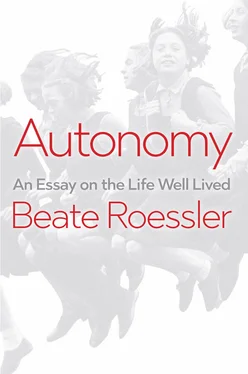1 ...6 7 8 10 11 12 ...20 This is the kind of concept of autonomy that stands at the center of debates around questions of what individual qualities or abilities must be attributed to a person if we want to be able to deem them more or less autonomous, and what social conditions are necessary to make these attributions. First, such debates frequently distinguish between global and local forms of autonomy. The concept is global when it refers to the whole person, to all of her actions; it is local when it refers only to certain actions or to a particular range of activity. The limited concept of local autonomy is often the more apt as it allows that certain motivations, social conditions, character traits, and other aspects of life may not be autonomous, without this necessarily meaning that we must deny the autonomy of the person as a whole . This is precisely how I apply the distinction between local and global autonomy, as I argue that we can be autonomous as persons even if certain actions or aspects of our lives are not autonomous. For attributing autonomy to a person (say, a reluctant smoker or, less trivially, a person with adaptive preferences), even if only in a local sense, is more commensurate with the practical value of autonomy. 23I do employ both concepts in this book, however – local autonomy and global – depending on context and the specific issue at hand. Moreover, the possible tension between our local inability to exercise autonomy and our general understanding of ourselves as autonomous persons can lead to discrepancies that are particularly illuminating for my approach to the question of autonomy in everyday life and autonomy as a precondition of a life well lived.
We can further understand the theoretical debates of recent decades as arguments about the conditions for the formation of the will of an autonomous person. I want to briefly outline these debates, as it is easier to develop a plausible concept of autonomy against this backdrop. We must tread carefully here, however, as the discourses of action theory and what is called moral psychology, both of which deal with the conditions of autonomy, are often extraordinarily granular and, at first glance, relatively far afield from the matter of autonomy in everyday life. Yet they are interesting insofar as, on second glance, they can in fact be linked back to an explanation of everyday autonomy and the question of a life well lived.
What, then, constitutes autonomy as a capacity? Procedural theories have been among the most influential in recent debates; they are also referred to as content-neutral theories, as they do not admit any content-dependent determinations (e.g. specific moral values, beliefs, or emotional attitudes) in the attribution of autonomy and only postulate formal conditions. 24There are a number of different varieties of procedural theories, the most prominent of which is surely Harry Frankfurt’s hierarchical model; no theory of autonomy, at least none of any analytical interest, can avoid grappling with this approach, which also comes up for discussion repeatedly in this book. Frankfurt’s model is hierarchical because it considers that a person may be called autonomous if she is able to take a second-order position (at the level of what are called volitions) with respect to her immediate, first-order desires, and then decide which of these desires she can identify with, which should affect her actions. Thus, for example, at the level of desire, a person may want to smoke a cigarette, but then reflect on this desire and come to the conclusion that it should not drive her actions – instead, a different desire should have the authority to move her to act. A person has a free will and is autonomous if she can go through this process and actually come to decisions that she acts upon, regardless of the origins of her desires (which she may have because she was manipulated), their content (which may be wicked), or their justifiability. If I have the will I want to have, I am autonomous – and I have such a will if I can, upon reflection, identify with a certain desire in such a way that it drives me to act. Identification (with a desire) and authenticity (it is actually my desire) are thus central to Frankfurt’s conception of autonomy, as is the hierarchical structure of the will, which is constitutive of being a person. 25
In his later works, Frankfurt seeks to halt the impending regression of first- to second- to nth -order desires through the idea of “wholeheartedness,” acting from one’s whole heart or with an undivided will – the motivational power that a person has when she has decided unconditionally to pursue a certain course of action, without any trace of a desire to even question her decision. This motivation results from a person’s fundamental “cares,” the things that are important to her in life, that she loves and cherishes, which determine how she acts and thus are able to end the regression of desires. 26
Yet – to raise an initial objection – it remains unclear how one is supposed to be able to resolve a conflict of desires if this regression can itself only be halted by other, stronger desires. Frankfurt overlooks the fact that even weighing two conflicting desires requires good reasons . There are reasons behind our actions, and reasons always have a normative dimension. This is something Frankfurt cannot refute, 27as becomes even clearer in the case of a second objection to his theory, called the manipulation argument. According to Frankfurt, a person’s autonomy does not depend on how she has come to the desires with which she identifies. Even if they are the result of manipulation, a person can still possess autonomy if her will has the proper structure. This is why such theories are called internalist theories, as they argue that autonomy is determined not by the source of our desires and beliefs but solely by the internal structure of our will.
Even at an intuitive level, however, it seems decidedly implausible to define a person’s autonomy only in terms of the internal formation of her will, without also taking into consideration her social environment and the sources of her desires and beliefs. More appropriate, then, are what are called historical theories, which include the causes of the emergence of desires among the conditions for the attribution of autonomy. John Christman, for example, argues that a person can only be deemed autonomous if she is (in principle) capable of reflecting upon the causes of her desires and beliefs and then either critiquing them with reasons or accepting them regardless. 28A person need not be substantively independent of external influences in order to be called autonomous, but she must be able to demonstrate procedural independence in her ability to reflect on the source of her desires and, as a result of this reflection, potentially reject her desires for good reasons. Thus acting autonomously means acting not simply on the basis of desires – however they may have arisen – but on the basis of reasons.
In order to be autonomous, then, a person must be able to identify with her desires and beliefs in such a way that she acts on the basis of her own reasons . This is the aspect of autonomy that Christman and others rightly call authenticity , a concept that repeatedly plays an important role in discourses of autonomy. If autonomy means being able to live one’s own life in accordance with one’s own ideas, values, and commitments, then the failure of autonomy as a result of manipulation, (self-)deception, or alienation can be described as a lack of authenticity. A person’s beliefs or intentions become her own beliefs or preferences when she can accept and endorse them in light of what is important to her – her other plans, her obligations, and her conception of herself – and when she does not feel alienated, or at least not too alienated, from them. 29
Читать дальше












